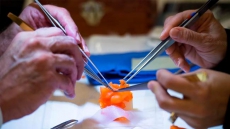SAVANNAH, Ga. — Mosquito-control workers are asking automotive retailers to get rid of old tires in the Florida Panhandle, lining up laboratories to test the insects for the Zika virus in New Orleans, and preparing to hunt down and destroy mosquito breeding sites in neighbourhoods of infected people in coastal Georgia.
These are among the advance steps that the heads of mosquito control agencies in U.S. cities and counties say they are taking to combat the Zika virus ahead of the typical springtime breeding season. They're among hundreds of municipal workers and insect researchers from around the nation attending the American Mosquito Control Association's annual conference, which opened Monday in Savannah.
Mosquitoes that spread the Zika virus are tough to fight because they breed close to people's homes: in the standing water of outside flower pots and dog bowls, and sometimes even in tub drains or other wet spots inside.
That makes them hard to target with conventional larvacide and insecticide sprays, said Mark Cothran, mosquito control director for Gulf County, Florida.
"You're not going to find them in roadside ditches or in swamps," Cothran said. "You're going to find them in dog food bowls or in 5-gallon buckets. It almost requires going door-to-door to dump out containers."
The Zika virus is spreading rapidly through Latin America. While most people experience either mild or no symptoms, Zika is suspected of causing a devastating birth defect — babies born with abnormally small heads — and pregnant Americans are urged to avoid travel to affected areas.

While the virus may be new to the U.S, the two mosquito species known to carry it are not.
Aedes aegypti, the mosquito blamed for the Zika outbreak linked to birth defects in Brazil, can be found in the southern U.S. from Florida to California. Another carrier is the Asian tiger mosquito, Aedes albopictus, which has a more northerly range that includes cities such as Chicago and New York.
U.S. mosquito fighters have already dealt with these species to prevent outbreaks of dengue fever and chikungunya virus, said Joe Conlon, the association's technical director.
"It's business as usual, because we know how to control these mosquitoes," Conlon said. "But in order to get rid of these things, you have to be very fastidious."
Cothran said his staff in the Florida Panhandle is calling automotive suppliers and urging them to get rid of old tires that can turn into mosquito incubators if they collect water.
New Orleans' mosquito control department, meanwhile, has lined up laboratories at Louisiana State University and Tulane University that are able to screen mosquitoes caught in surveillance traps for the Zika virus, said department director Claudia Riegel.
Jeffrey Heusel, mosquito control director for Savannah and surrounding Chatham County on the Georgia coast, said his department is ready to target specific neighbourhoods or subdivisions where Zika cases are reported to the local health department. He said workers will hunt down breeding sites, eliminate standing water and use up-close spraying in a half-mile radius — twice the flight range of the carrier mosquitoes.

"It's a localized approach as opposed to spraying the whole city," Heusel said.
Harry Savage, chief entomologist with the federal Centers for Disease Control and Prevention, said his best guess is that Zika infections transmitted within the U.S. will stay relatively small — much like dengue fever, which averaged 25 cases per year from 2010 to 2015 — though he said he can't be sure.
Savage said mosquitoes are far less likely to be found breeding inside U.S. homes, which as a rule have screened windows and air conditioning, than they are in Latin American homes, which often don't.
Still, Americans' backyards tend to offer plenty of dank breeding spots, from crumpled tarps to children's toys. And while mosquito control officers said they are prepared to spread the word for residents to clean up standing in water in their yards, it's very tough to get homeowners to act, Savage said.
"Source reduction by individuals usually doesn't work because people are too lazy to clean up their own yards," Savage said.
And U.S. homeowners often aren't pleased to see mosquito control officers at their doors telling them to tidy up their property, Conlon added.

"In the U.S., we don't like the government in our houses," he said.






